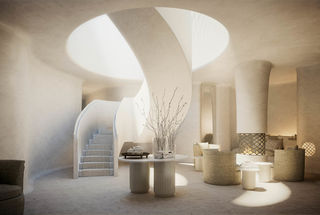Ultra-Luxury Hotelier Aman Launches a New, More-Affordable Brand
Janu is the first spinoff for the standard-setting resorts.



Considered by many to be the most luxurious hotel company in the world, Aman is spinning off a second brand 32 years after becoming a standard-setter, with properties set to open in 2022. Called Janu, it looks to be a little more fun, a lot less secluded, almost equally high-end, and about 30% more affordable. Its first three locations will be in Tokyo; Sveti Stefan, Montenegro; and the archaeologically rich city of Al Ula, Saudi Arabia.
"Listening to our guests and to travel professionals, I think we have really identified a gap in the market," says Roland Fasel, Aman's chief operating officer, speaking exclusively to Bloomberg from his office in London ahead of the official announcement. "On one extreme you have the Amans of the world, [ultra-luxury resorts] which offer a sort of spiritual experience. And on the other side, you have lifestyle-driven brands," which he considers to trade some amount of comfort for the sake of accessibility.
Those lifestyle hotels—such as Edition, 1 Hotels, or Nomad—can certainly be high-end, but they need to be more affordable than top-tier luxury brands to lure a young-and-energetic target audience. And they can't be too exclusive if they want to draw in and capitalize on the buzz of the local community.
"Nobody in the luxury space has explored the middle ground between them," Fasel says.
Fasel envisions Janu as a place where guests can commingle at morning yoga classes, on property-led street art tours, or at an array of restaurants and bars, some of which will have DJs and live entertainment throughout the week. All of this would be housed in a single mid-rise building—generally six or seven stories tall—offering about 120 guest rooms and a staff-to-guest ratio of 3 to 1. (Compare that to Aman's 6-to-1 ratio.)
This playbook, standard operating procedure for trendy hotels and resorts these days, represents a sharp departure for Aman. The company's fame rests on very small, precious, and exclusive properties, where each of around 40 bungalows or casitas is physically separate from its neighbor. Aman room rates average $1,400 a night; Janu will hover in the $1,000-per-night range—several hundred dollars higher than the lifestyle brands its hoping to one-up.
